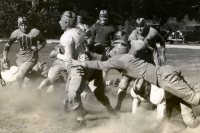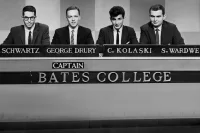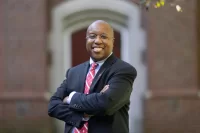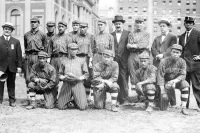
In April 1979, Martin Levenson ’81 ran down Hereford Street in Boston. It was his first Boston Marathon, and he was close to the final stretch.
Pushing toward the finish among thousands of other runners, Levenson heard someone call his name. Up on a light post was his childhood friend Richard “Ratt” Kennedy, there to watch him cross the finish line.
“I finished a little faster,” says Levenson. “That was motivational and exciting, a great memory from that day.”
Levenson and Kennedy were both runners, both young, healthy, and with plenty of Boston Marathons ahead of them.
Forty years later, Levenson is again running the Boston Marathon. And Kennedy will again be on hand to cheer him on.
For the two friends, however, little else is the same. Levenson, sidelined from running for years due to health issues, is returning to the Marathon for the first time in 26 years. He’s running with a purpose: to honor Kennedy’s fight against amyotrophic lateral sclerosis.
Diagnosed with ALS in 2016, Kennedy is prominent in the Boston area for raising awareness and funds to fight the disease that took the lives of his father, in 1989, and a younger brother, at age 31, in 1997.
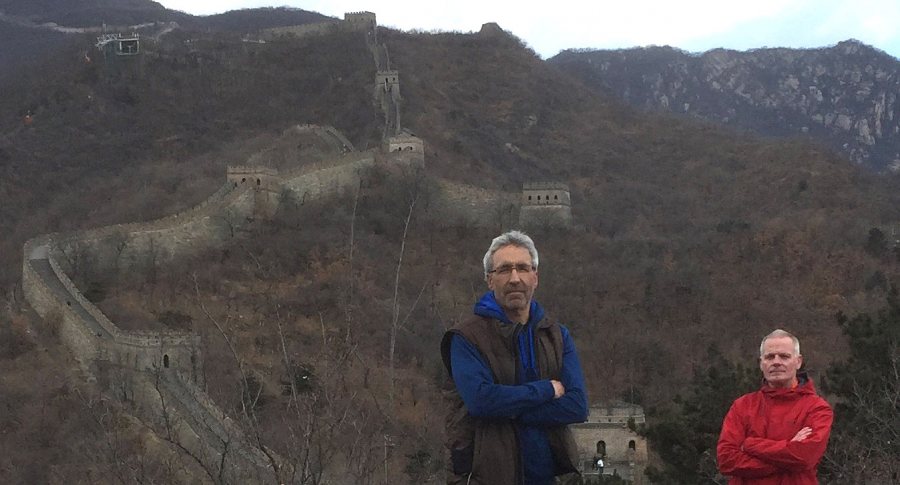
Martin Levenson ‘81, left poses on the Great Wall of China in March 2017 with Richard “Ratt” Kennedy. After Kennedy was diagnosed with ALS, the pair traveled the world. (Courtesy of Martin Levenson)
Levenson’s return to the Bay State’s iconic race “seemed to make perfect sense, because of what running means to us and what the Boston Marathon means to us,” he says. “Putting it all together just seemed so right.”
Kennedy, whose father was the dean of students at Northeastern University, and Levenson grew up in Quincy, Mass. They ran track together in high school, bonding over “similar senses of humor and senses of mischief,” Levenson says.
Levenson went off to Bates, and Kennedy would often hitchhike up to Lewiston for visits. Levenson majored in political science and spent his junior year in northern England, and made friends both inside and outside the track team.
“The great thing about Bates is, because it was small you got to know people,” Levenson says. “You weren’t restricted to the activity that you were in. You got to meet people from all sorts of different backgrounds and activities. The exposure was wonderful.”
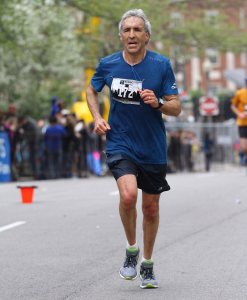
Martin Levenson ‘81 qualified for the Boston Marathon at the Providence Marathon in May 2018. (Courtesy of Martin Levenson ’81)
Back then, tackling a marathon seemed almost routine. Running cross country for coaching legend Walt Slovenski, Levenson regularly clocked 15- to 20-mile outings around Lake Auburn. Kennedy, meanwhile, ran at Northeastern.
There was little reason for either of them to worry much about health. “Back then,” Levenson said, “you just ran.”
After graduation, Levenson launched a career in marketing and communications in the Boston area; he’s now a vice president at American Home Shield. Kennedy, meanwhile, built a physical therapy practice.
Kennedy’s family has what is known as familial ALS, a version of the fatal disease that can be passed from one generation to the next. Familial ALS accounts for only about 10 percent of all ALS cases, but the children of people who have the disease have about a 50 percent chance of contracting it themselves.
As president of The Angel Fund for ALS Research, Kennedy has helped to raise millions of dollars, most of it directed to top ALS researcher Robert H. Brown Jr., of the University of Massachusetts Medical School.
For years, running was a “constant” in their friendship, Levenson says. They’d run together at 11 p.m. if there was no other time to do it, and they made sure to come together each year for the Boston Marathon.
A few years after Levenson’s sophomore-year debut, Kennedy ran the marathon, and did so almost every year for the next 30 years. Levenson ran the marathon less frequently — he’s done about six, he estimates. Instead he often ran a hydration station at the beginning of the race, in Hopkinton.
“We were going to leave this place without any regrets.”
Every year before the start of the race, Kennedy would “find me, we’d hug, and I’d escort him to the start. It was just a great tradition.”
As time passed, Levenson’s health issues mounted. In 2007, he lost sight in one eye due to an orbital tumor. His hips deteriorated (not because of running, he stresses), and while he kept up with the gym, he put on weight, discouraging running even more.
By the late 2000s, he stopped running entirely. His world got a bit smaller.
But Kennedy helped expand it. After his eye surgeries, driving in particular frightened Levenson. One night, Kennedy invited him to dinner, but said Levenson would have to meet him at the restaurant.
“He made me drive to a halfway point, the first time I’d driven a car since the surgery,” Levenson says. “He knew it was me confronting my fears. I marked that as really the first full day of my recovery.” Kennedy also helped with physical therapy when, a few years later, Levenson got both hips replaced.
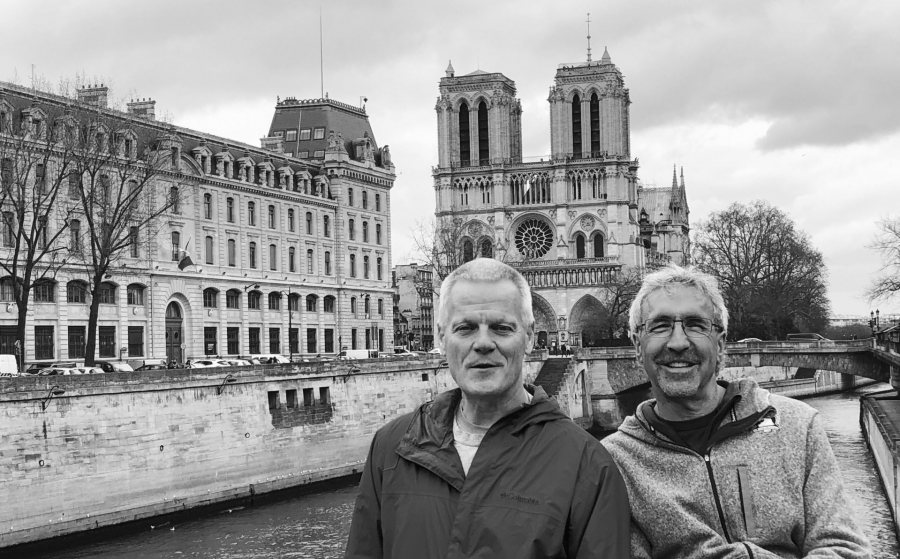
Richard Kennedy, left, and Martin Levenson ’81 traveled to Paris in January 2019. (Courtesy of Martin Levenson)
Kennedy helped Levenson through tough but survivable troubles. But how do you reciprocate in the face of a cruel illness? Hearing of Kennedy’s ALS diagnosis left Levenson feeling “helpless,” Levenson says. “I thought, ‘What can I do?’
“I vowed to him, however much time he had left or I had left, we were going to make the most of it, and we were going to leave this place without any regrets.”
In a way, Levenson did reciprocate what Kennedy had done for him — helping to open the world to his friend. They took trips: San Francisco, Beijing, England, Paris. And, because Kennedy could no longer run the Boston Marathon, Levenson decided to do it for him.
“I’m just happy to be out there and be able to put the miles in.”
Kennedy himself devised for his friend a marathon training schedule involving several days of running per week plus cross-training and weights.
Though Levenson’s stride is much shorter than it once was, and he can’t clock multiple marathon-length runs a month like he could at 20, Levenson is grateful for being able to run at all.
“It isn’t tough,” Levenson said. ”No matter if it’s raining or snowing or whatever, I’m just happy to be out there and be able to put the miles in.”
Levenson qualified for the Boston Marathon at last May’s Providence Marathon. The money Levenson raises by running the Boston race will go straight to The Angel Fund.
What’s Levenson most looking forward to? “My family and Ratt’s family in Brookline at the 24-mile mark. Getting there will be great motivation.
“I know the last two miles will be a breeze.”
